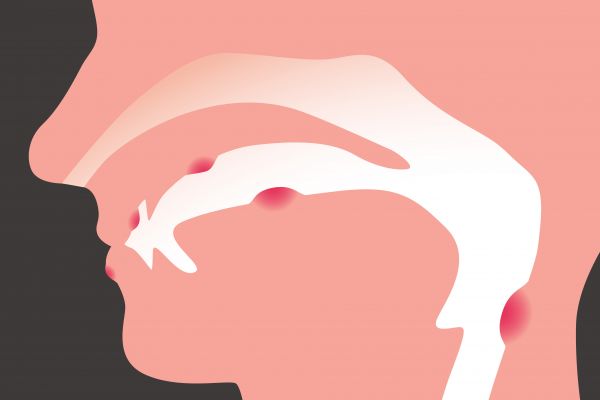Oral health is a crucial component of cancer care.
About 40 percent of patients develop complications that affect the mouth. Head and neck radiation, chemotherapy, and blood and marrow transplantation can cause issues ranging from dry mouth to life-threatening infections. These problems interfere with cancer treatment and affect quality of life.
Dental and Oral Side Effects
Oral complications caused by cancer treatment include:
- Osteonecrosis
- Dry mouth
- Cavities
- Thickened saliva
- Changes in taste
- Mouth sores
- Tooth decay
- Difficulty swallowing
- Difficulty chewing or opening the mouth
- Infection
- Inflammation or pain in the lining of the mouth and tongue
Managing Oral Side Effects
If you experience any dental or oral side effects, let your doctor or nurse know immediately. Follow these tips to help relieve some of the symptoms.
- Mouth rinses that contain salt and baking soda may help treat mouth sores. Rinse often with 1/4 teaspoon of baking soda and 1/8 teaspoon of salt in 1 cup of warm water.
- Ask your doctor or nurse about pain medications. Medications may be placed directly on the sores, taken by mouth or given through an IV.
- Antibiotics, antiviral drugs and antifungal drugs are used to treat infections.
- Drinking water and sugarless drinks may help manage dry mouth. Sucking on ice chips may also help. Avoid things that will dry out the mouth, such as soda, fruit juice and alcohol.
- Medications that produce saliva may help some people prevent or minimize dry mouth. For others, topical oral gels or other medications may help dry mouth caused by radiation therapy to the head and neck.
Most side effects will disappear when treatment ends. But there are steps you can take before, during and after treatment to lessen the burden.
Never miss another Cancer Talk blog!
Sign up to receive our monthly Cancer Talk e-newsletter.
Sign up!Before Treatment
Before any cancer treatment begins, see your dentist for a complete exam and x-rays to rule out any dental infections, areas of decay or periodontal disease.
During Treatment
During cancer treatment, check with your oncologist or dentist regarding any precautions to take regarding dental treatments and to check for metastasis in the mouth. During treatment, the following tips may help improve your oral health and prevent side effects:
- Follow your regularly scheduled hygiene appointments.
- Gently brush your teeth two times a day and floss regularly. Soak an extra-soft toothbrush in warm water to soften the bristles before brushing, or use a child-size, soft toothbrush if your regular brush is too bulky or uncomfortable.
- Avoid alcohol and extremes in your diet. Eat foods that are soft and mild. Extremely hot, cold, spicy, acidic, or crunchy foods may irritate your mouth.
- Get enough vitamin D and calcium each day to help your jaw and teeth stay strong and healthy.
After Treatment
After cancer treatment, continue with your scheduled appointments. Some salivary glands do not return to normal function after treatment, and it’s important to monitor for rampant decay.
For more information about oral and dental health, or to schedule an appointment, contact Roswell Park’s Department of Dental & Maxillofacial Services at 716-845-5970.


